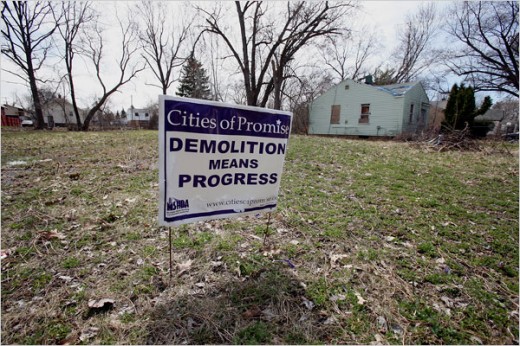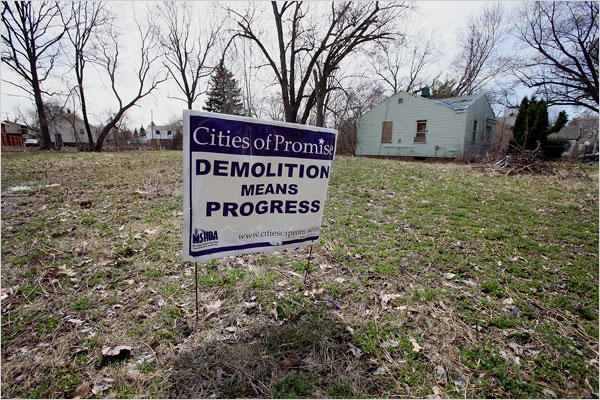
An article on Flint, Michigan in the New York Times earlier this week discussed the proposal for the intensifying and speeding up of the city’s decline—and it might be genius. Don’t wait for houses to become abandoned before they get demolished, instead pull down entire neighbourhoods and move the population. Concentrate everyone remaining in the city to a few key areas, and build that density.
In short, planned shrinkage.
I don’t think Windsor is quite this bad; though this could very well be coming down the pipes sooner than we expect. The fallout of the current economic realities is slowly being realized across the city, but if you really want to imagine Windsor in 10 years if we don’t make some radical change, just go for a drive down Indian Road (or anywhere in the West end, really).
So, if you were offered a similar place to where you live now, but in a denser area, would you take it?

Huh. Forced expropriation of homes in poor neighborhoods, with the pitch being sold by the man who runs the organization that would assume ownership of the newly-vacant land? Color me suspicious because I think I’ve heard this one before.
While the result is certainly a desirable one, eminent domain is some tricky stuff, and I’m not sure that the means of achieving that result are even remotely ethical. Not only is property being seized, but, from what I gather, one isn’t simply given monetary compensation, rather instructed to move to a specified location. Now, legally I’m sure compensation will have to be an option, but one might question the likely fairness of that compensation. For someone living in one of these declining neighborhoods, the assessed value of the home isn’t going to be nearly enough to purchase another one elsewhere, so, even if you’re not being mandated to move to one of the newly-concentrated residential areas, you’re being pretty effectively bullied into doing so. And, all purportedly-good intentions aside, that’s pretty shitty.
If they get unilateral support for the plan, which they of course won’t, great—bulldoze away. The complete lack of any dissenting opinion in the Times piece is pretty troubling, though. You must remember that this is America that we’re talking about; ceding property for the greater good is not really part of the national character.
Great insight Steven. I was under the impression that the land bank was just part of the county’s operations, but regardless, you’re right—being forced out of your home would be really rough.
What do you do though? If your tax dollars are going to pay for garbage collection for one house on a street, or road repairs anywhere outside of the core, ultimately, that’s not the best way to spend that money.
More than likely though, even if they were able to slash their spending by concentrating population, the cuts wouldn’t end there, and with a $15 million deficit, it would be a long time before a systematized abandonment of neighbourhoods would have any positive effect in upgrading core services, or non-essential spending.
I’m curious when the last time Flint saw any new people moving into the city.
No, it’s not shitty, it’s hope. The ultimate value of those houses is zero– not low– zero. And though their pride may be hurt now, those people will otherwise eventually abandon those houses or die in them. Right now, they are trapped where they are. At least by moving, they have a chance to own a home that might appreciate in the future.
Is it absolutely fair? No, but that’s life. It’s not fair when the government says your neighborhood is going to be destroyed for a new bridge either, or that you can’t rebuild in the same spot after a flood. Flint has been facing a decades-long disaster and just can’t keep supporting far-flung infrastructure. It needs to concentrate of saving the good neighborhoods it still has– and Flint still does have good neighborhoods.
The only alternative would be to dis-incorporate portions of the city, which would leave a lawless area of uncollected trash, crumbling streets, broken sewers and empty water mains. Much better to plant new forests and create sprawl limits for future generations.
The same goes for Detroit– a city built for 4 million with a peak population of 2 million. Detroit already has entire blocks that are reverting to nature. It is the perfect opportunity to permanently remove streets from the grid.